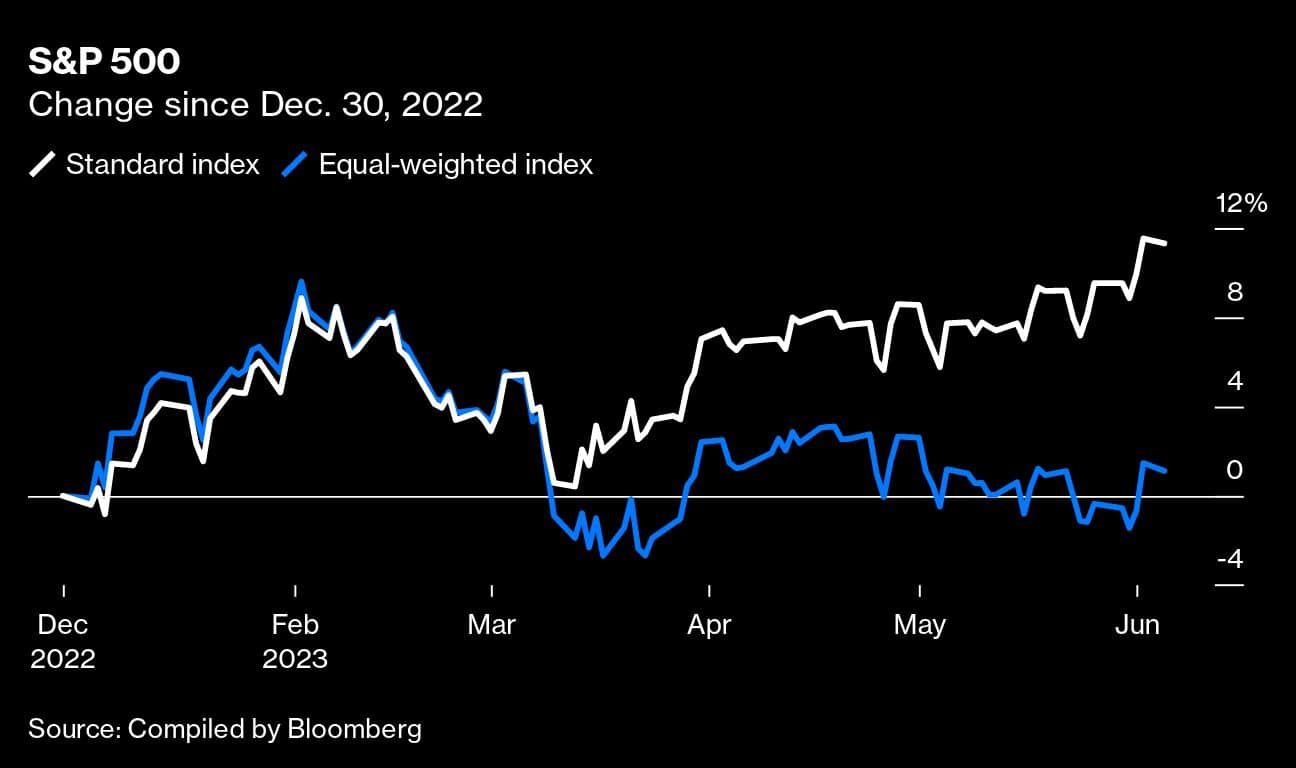
Need reasons to feel pessimistic about stocks? They’re everywhere. Inflation, a hawkish Federal Reserve, endless political strife, nosebleed valuations, a potential recession, wobbly regional banks—those are just for starters. Then there’s the bullish case, which has more or less one plank: a nascent technology that’s famous mainly for inciting fears of mass unemployment and, perhaps, the subjugation of humanity.
Guess which side investors are on.
A serious rally has—somehow—erupted in US technology stocks thanks almost solely to investor ardor for artificial intelligence. More than $4 trillion has been added to the value of companies in the Nasdaq-100 Index since the start of the year—a particularly fast conjuring of wealth, even by the standards of the pandemic-era frenzy. The Nasdaq is up about 31% so far in 2023, and tech stocks have also helped pull the broader S&P 500 up about 11%. Technology-focused funds attracted a record $8.5 billion from investors during the last week of May, according to EPFR Global data compiled by Bank of America Corp. strategists.
Fear of missing out is a classic inflater of bubbles—see the dot-com boom, meme stocks and crypto—and there’s a lot of that around AI. But this anxiety has a darker edge. “It’s not just FOMO—my impression is that it’s FOBR, fear of being replaced,” says Vincent Deluard, director of global macro strategy at StoneX Financial. “Basically, we think, ‘Oh my God, AI is going to take over the world, my job. And the only way I can hedge it is by owning the damn robots.’ So you buy Nvidia, you buy Microsoft.”
The speed with which the AI narrative transformed previously glum investor sentiment has been as breathtaking as the rally itself. “The really big AI weeks” hit near the end of May, says Lauren Goodwin, economist and portfolio strategist at New York Life Investments. That’s when Nvidia Corp. forecast sales that blew past analysts’ estimates because of demand for its AI processors, boosting its market value to near $1 trillion, a rare feat. The chipmaker’s chief executive officer predicted a vast overhaul of data centers around the world to accommodate “generative” AI applications, which include ChatGPT and other tools that create new content such as text or images based on prompts.
The market for generative AI itself could expand more than 40%, to $1.3 trillion, by 2032, according to Bloomberg Intelligence. “There’s always this element in the market of a bazillion interesting ideas—but show me the money, show me how this is going to impact or disrupt workflow, business processes,” Goodwin says. “And people can see the impact now.”
 Source: Bloomberg
Source: Bloomberg
The gains in AI-tinged stocks are blotting out everything else in the market, with companies whose fortunes are more closely tied to the real economy performing relatively weakly. Value stocks as well as those of small and midsize companies have notched smaller gains in 2023, signaling lingering caution about higher interest rates and slower economic growth. A version of the S&P that weights stocks equally—instead of being loaded with the tech shares investors already value most—is a bit better than flat in 2023. So is the Dow Jones Industrial Average, which tries to be a representative slice of blue-chip corporate America. The normal S&P 500’s gain this year would basically evaporate without just a few names, including Nvidia and Microsoft Corp., which is integrating AI into its products.
The craze is launching valuations to levels that have precipitated significant investor pain in the past. Nvidia stock costs 185 times its earnings per share over the past four quarters, compared with a typical ratio of 19 for S&P 500 companies. The company is trading at 37 times its recent annual sales.
With normal companies, a price-sales ratio of 3 might be enough to give analysts pause. “If you recall, back in early 2000, investors were piling into tech because they were ignoring the fact that tech was trading at 60 times forward estimates” of earnings, says Sam Stovall, chief investment strategist at financial researcher CFRA. “Unfortunately for those who did, it took them five years until the Nasdaq got back to breakeven.” Of course, internet technology still changed the world after the dot-com crash—it just wasn’t always an easy way to make money.
Pause a moment to consider how little investors—or almost anybody—really understand yet about AI and how it will be applied in the real world. AI bots can carry on eerily humanlike conversations, but the answers they give are still famous for errors and “hallucinations” of made-up information. “Bad results can’t be used for important functions,” says Art Hogan, chief market strategist at B. Riley Wealth Management. “So to the extent this is going to be exciting, it may take longer than initially anticipated.”
Bulls take heart in the maturity of the companies leading this year’s tech boom, which also include Apple, Amazon.com and Meta Platforms. These aren’t the profitless unicorns that dotted the dream landscape during past bubble episodes—they’re the aristocracy of American commerce. In the late 1990s, companies were evaluated on metrics such as eyeballs and clicks “that just made no economic sense,” says Chris Harvey, head of equity strategy at Wells Fargo & Co. “But when we look at the companies that are some of the technological leaders in AI, they have good balance sheets.”
Another distinction is the spending power of the people who might be considered customers of the AI craze: the treasurers of corporate America. Cash on corporate balance sheets soared during the pandemic and remains high. Cash and equivalents for all companies in the S&P 500 clocked in at $574 per share in the first quarter, according to data compiled by Bloomberg. While that’s down from a peak of $659 at the end of 2021, it’s still about 30% above the level of the fourth quarter of 2019, just before the pandemic. Some see a chunk of that pile of cash going toward AI projects.
Capital spending on AI is likely to go well beyond the traditional tech industry. Jennifer Chang, a portfolio manager at Schafer Cullen Capital Management Inc., says health-care and pharmaceutical companies are talking about using the tech to reduce research timelines. But not all businesses will benefit equally from generative AI, because many are unwilling to make “the big changes” required, says Andrew McAfee, a research scientist at the Massachusetts Institute of Technology and co-founder of Workhelix, an AI company. “When you look at the spending on digital technologies by US companies, it’s just going steadily up—our thirst for digital stuff is bottomless,” he says. “But technology isn’t a competitive leveler. The performance gaps between companies in industry after industry are getting bigger instead of smaller.”
And as companies try to ride the boom, investors should expect to sort through a lot of AI-ish-sounding puffery. “We have seen this before—something gets hyped, companies start to change their name so that you can inject ‘AI’ directly into the name, AI is mentioned on conference calls, company websites and public releases,” says Cam Harvey, a finance professor at Duke University and a partner at money manager Research Affiliates. “It can go up very fast and come down very fast. This is not just talk. Consider the history of things that get hyped, that’s exactly what happens.”
Discover the latest Business News, Sensex, and Nifty updates. Obtain Personal Finance insights, tax queries, and expert opinions on Moneycontrol or download the Moneycontrol App to stay updated!